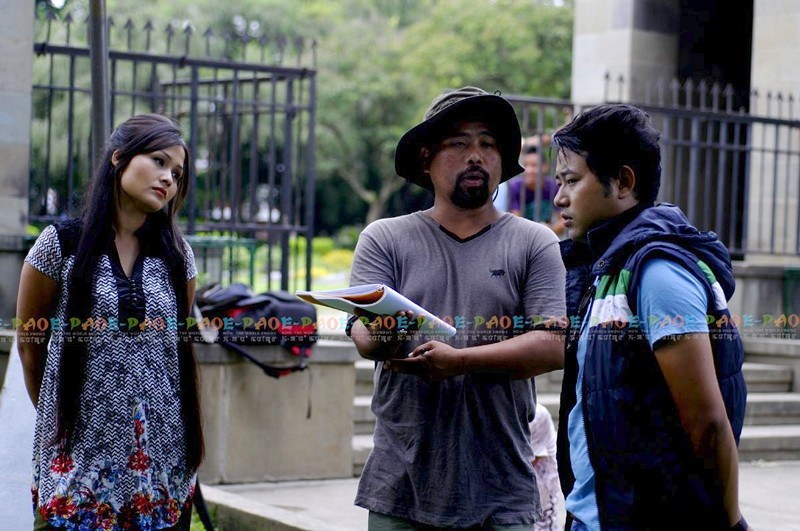Manipuri Cinema as an escape route :: Part 1
Bobby Wahengbam *

A scene from 'Sangbrei Managi Chengi Manam''
Is cinema an 'escape' from our stinking social, political and economic mess? Yes, it is definitely a recreational platform. We wish cinema, though an important oasis in our desert of social and personal malady, is also considered as a platform for high art like the French New Wave directors did more than five decades ago. For them too, it was a means for them to escape from their stark unfavourable reality in their formative periods.
Cinematic icon Godard (Breathless, 1959; Weekend, (1967) described cinema screen as 'the wall we had to scale in order to escape from our lives'. He self studied film intensively. His (Godard) passion was also linked to a form of escapism. Rumours of the pair's (with Truffaut) early viewing sessions have reached mythic status. At one point, Godard alone was said to be watching around 1,000 films a year. But the life of the average cinephile involved more than just viewing films (Wiegand Chris, French New Wave, 2007.p.12).
Earlier, Francois Truffaut (The 400 Blows, 1959: Jules and Jims, 1961), one of the greatest filmmakers ever, had already taken solace to cinema in his early period. One of the key figures, Francois Truffaut, already had an especially intense and involved relationship with the cinema. He had turned to films at an early age, finding them a kind of refuge from his unhappy home life with his mother and stepfather.
Truffaut's teenage years were dogged by petty crime and a spell in a young offenders' institute. The cinema managed to give his life some sort of focus (Wiegand Chris, 2007.p.12). Before venturing into film direction, almost all the film makers of French New Wave (Nouvelle Vague) came together to see world cinema, studied and criticised films during screenings and published magazines of which 'Cahiers du cinema' was the most important which featured reviews and general discussions on cinema theory. Such rituals actually paved the birth of the New Wave, a new way of presenting cinema that changed the whole vocabulary of cinematic art and grammar.
And luckily enough, most of the films of the period fared well at the box office though definition of cinema was redefined all over again. But here in Manipur, we are still stuck to old system of film making shying to change where formal education or study or discussion about filmmaking becomes a luxury probably for lack of time and space. Rather, we are fast learners and followers of NIKE's 'just do it'.
Everybody has just done it to churn out more than 60 feature films every year for the last 11/12 years. But it is shocking to learn that a feeling of disorientation is being felt by some of our 'better off' film makers of the period who have bravely expressed their displeasure on the film they have had made. After making a century of full length feature films, Bishwamitra, a doyen among the filmmakers of the generation, feels nostalgic looking back to his short but lengthy journey.
You'll know the real Bishwamitra by seeing my short and documentary films but not by 100 feature films I've made. Because of many factors including limited market, restricted budget, commercial motive, I can't do justice and be good in feature film making. Please read me well through my short and documentary films (Bishwamitra Kwarakpam on ISTV, Short and Documentary film festival, 9 June, 2015).
Bishwamitra is bold enough as he has already made a niche in short and documentary film making with couple of his film in the genres could get recognition in National and International Film festivals. His comment also speaks volumes about the nature of work we are doing in the commercial based feature film making which is probably done for a living. He can't be rhetoric as he is still making feature film. The same sense of 'loss' has also been expressed by Romi Meitei, another great name in the contemporary Manipuri film world.
As a student who learns on work and experience, I'm, now, really puzzled which way I have to take. Sometimes, I feel like giving up filmmaking to learn the art and nuances of film making. And yet, some times, I feel like keep on making film without considering 'learning'. Good learning needs formal institution (Romi Meitei, Discussion on the future prospect of Manipuri Cinema, AMFVMPA, MFDC, 2012).
The view of the two film makers come out after they have achieved something through their shorts and documentaries in International and National arena and seen works of others. Their views cannot be taken lightly as they have had a long innings with feature film making. But the tragedy is that a gap has been suddenly formed between them and their following audience.
To be continued...
